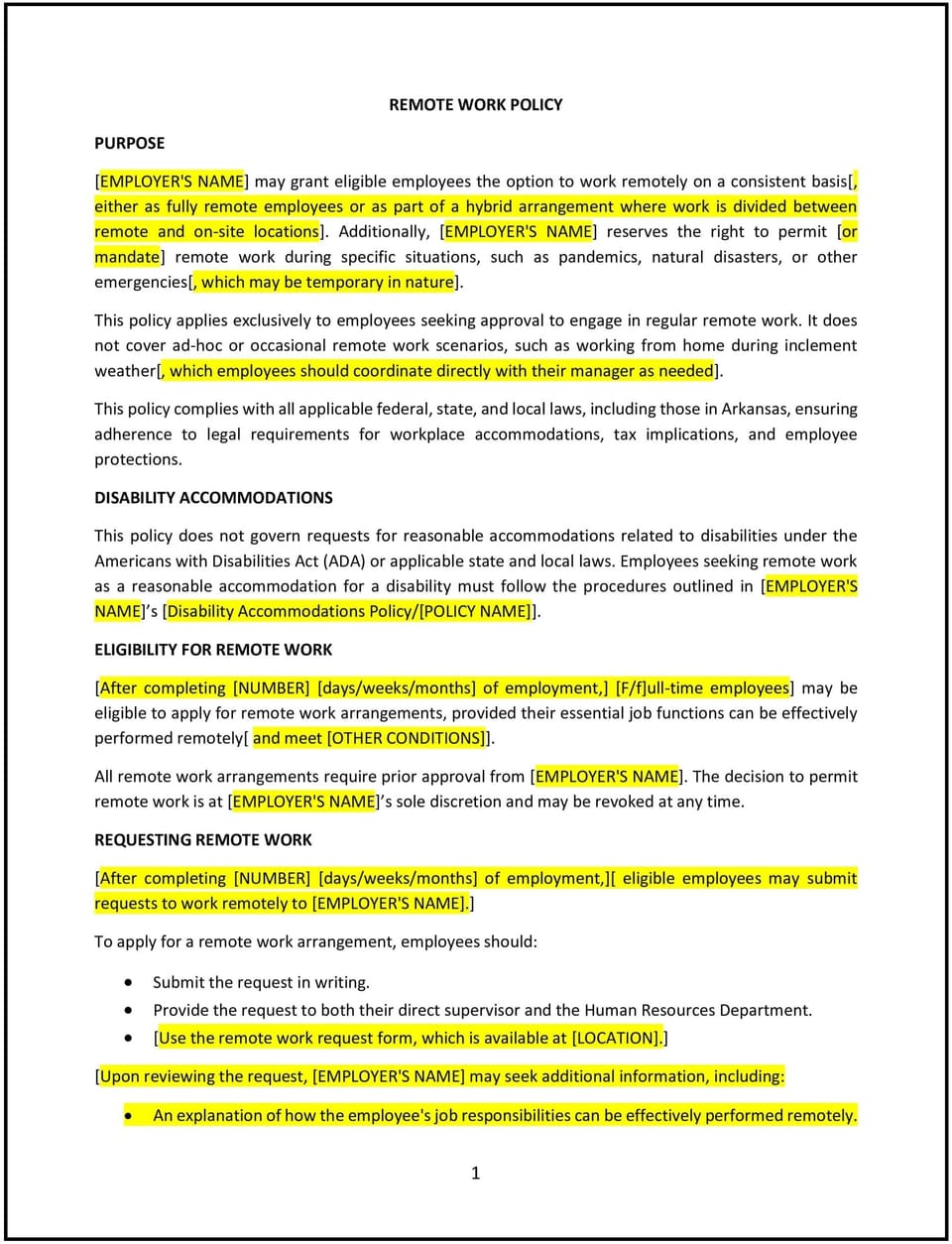Remote work policy (Arkansas): Free template

Remote work policy (Arkansas)
In Arkansas, a remote work policy provides businesses with guidelines for managing employees who work from home or other locations outside the office. This policy ensures clear expectations, enhances productivity, and supports compliance with labor and tax regulations.
This policy outlines eligibility criteria, work expectations, and requirements for remote work arrangements. By implementing this policy, Arkansas businesses can create an efficient and accountable remote work structure that benefits both employees and operations.
How to use this remote work policy (Arkansas)
- Define eligibility: Clearly state the criteria for employees eligible for remote work, such as job roles or performance requirements.
- Set work expectations: Outline responsibilities, work hours, communication standards, and performance metrics for remote employees.
- Address equipment and security: Specify the business’s responsibilities for providing equipment and the employee’s role in maintaining data security.
- Establish review processes: Include periodic evaluations to ensure the remote arrangement continues to meet business needs and performance expectations.
- Communicate termination terms: Provide guidelines for modifying or ending remote work arrangements if needed due to operational changes or performance issues.
Benefits of using this remote work policy (Arkansas)
This policy offers several advantages for Arkansas businesses:
- Improves flexibility: Supports employees’ ability to work efficiently from various locations, improving job satisfaction and retention.
- Promotes accountability: Establishes clear expectations for remote employees, ensuring productivity and alignment with business goals.
- Supports compliance: Reflects Arkansas labor laws and federal tax regulations, reducing risks of non-compliance.
- Enhances security: Provides protocols to protect sensitive business data in remote work environments.
- Streamlines communication: Ensures consistent and effective communication between remote employees and their teams.
Tips for using this remote work policy (Arkansas)
- Address Arkansas-specific considerations: Include any state-level tax or employment requirements related to remote work.
- Train managers: Provide guidance on supervising remote employees effectively, including performance evaluations and communication strategies.
- Use secure systems: Implement tools for secure file sharing, communication, and project management to support remote work operations.
- Monitor performance: Regularly assess employee output to ensure remote arrangements align with business objectives.
- Update regularly: Revise the policy to reflect changes in laws, technology, or business needs.
Q: How does this policy benefit the business?
A: This policy enhances flexibility, supports compliance with Arkansas labor and tax laws, and ensures clear expectations for managing remote employees effectively.
Q: What roles are eligible for remote work under this policy?
A: Eligibility is based on job responsibilities, performance history, and the business’s operational requirements, as outlined in the policy.
Q: How does this policy support compliance with Arkansas laws?
A: The policy incorporates best practices to manage remote work while adhering to state-specific employment and tax regulations.
Q: What equipment is the business responsible for providing?
A: The business may provide essential tools like laptops, software, or secure connections, with specifics detailed in the policy.
Q: How can the business ensure productivity in remote work arrangements?
A: The business can set clear goals, maintain regular check-ins, and use performance metrics to monitor progress and address challenges proactively.
This article contains general legal information and does not contain legal advice. Cobrief is not a law firm or a substitute for an attorney or law firm. The law is complex and changes often. For legal advice, please ask a lawyer.


